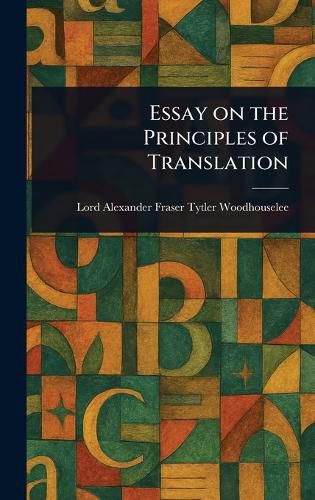Readings Newsletter
Become a Readings Member to make your shopping experience even easier.
Sign in or sign up for free!
You’re not far away from qualifying for FREE standard shipping within Australia
You’ve qualified for FREE standard shipping within Australia
The cart is loading…






This title is printed to order. This book may have been self-published. If so, we cannot guarantee the quality of the content. In the main most books will have gone through the editing process however some may not. We therefore suggest that you be aware of this before ordering this book. If in doubt check either the author or publisher’s details as we are unable to accept any returns unless they are faulty. Please contact us if you have any questions.
Alexander Fraser Tytler's "Essay on the Principles of Translation" remains a foundational text for anyone interested in the art and craft of literary translation. This influential work explores the core principles of effective translation and interpretation, offering insights into the complex relationship between original text and translated work.
Tytler delves into the nuances of conveying meaning, style, and intent across languages, examining the challenges and rewards of bridging cultural and linguistic divides. His essays provide a framework for understanding the translator's role as both interpreter and writer.
This meticulous print republication offers a valuable resource for students, scholars, and anyone fascinated by the theory and practice of translating and interpreting. Explore the timeless wisdom of this classic exploration of language, writing, and literary criticism.
This work has been selected by scholars as being culturally important, and is part of the knowledge base of civilization as we know it.
This work is in the public domain in the United States of America, and possibly other nations. Within the United States, you may freely copy and distribute this work, as no entity (individual or corporate) has a copyright on the body of the work.
Scholars believe, and we concur, that this work is important enough to be preserved, reproduced, and made generally available to the public. We appreciate your support of the preservation process, and thank you for being an important part of keeping this knowledge alive and relevant.
$9.00 standard shipping within Australia
FREE standard shipping within Australia for orders over $100.00
Express & International shipping calculated at checkout
This title is printed to order. This book may have been self-published. If so, we cannot guarantee the quality of the content. In the main most books will have gone through the editing process however some may not. We therefore suggest that you be aware of this before ordering this book. If in doubt check either the author or publisher’s details as we are unable to accept any returns unless they are faulty. Please contact us if you have any questions.
Alexander Fraser Tytler's "Essay on the Principles of Translation" remains a foundational text for anyone interested in the art and craft of literary translation. This influential work explores the core principles of effective translation and interpretation, offering insights into the complex relationship between original text and translated work.
Tytler delves into the nuances of conveying meaning, style, and intent across languages, examining the challenges and rewards of bridging cultural and linguistic divides. His essays provide a framework for understanding the translator's role as both interpreter and writer.
This meticulous print republication offers a valuable resource for students, scholars, and anyone fascinated by the theory and practice of translating and interpreting. Explore the timeless wisdom of this classic exploration of language, writing, and literary criticism.
This work has been selected by scholars as being culturally important, and is part of the knowledge base of civilization as we know it.
This work is in the public domain in the United States of America, and possibly other nations. Within the United States, you may freely copy and distribute this work, as no entity (individual or corporate) has a copyright on the body of the work.
Scholars believe, and we concur, that this work is important enough to be preserved, reproduced, and made generally available to the public. We appreciate your support of the preservation process, and thank you for being an important part of keeping this knowledge alive and relevant.